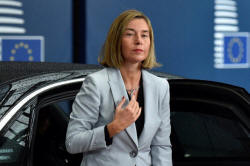|
EU's executive offers
funds for Franco-German defense plans
 Send a link to a friend
Send a link to a friend
 [June 07, 2017]
By Robin Emmott and Gabriela Baczynska [June 07, 2017]
By Robin Emmott and Gabriela Baczynska
BRUSSELS
(Reuters) - The European Union's executive threw its support on
Wednesday behind Franco-German plans to integrate Europe's militaries
and defense industries, offering money and coordination to build up
depleted forces heavily reliant on the United States.
Spurred by Britain's decision to leave the European Union, Brussels has
seized on deeper military ties proposed last year by France and Germany
to show its citizens the bloc is still relevant and can provide security
in the face of Islamist militant attacks and a resurgent Russia.
"Defense and security is one of the fields through which we can
re-launch the European Union," EU foreign policy chief Federica
Mogherini told a news conferences.
Failings in Europe's bombing campaign in Libya in 2011, when the United
States had to step in with refueling planes, and Russia's 2014
annexation of Crimea have reignited EU defense plans that date back to
the 1950s but have remained elusive.
Britain had long blocked EU defense integration, fearing a European
armed force wearing the same uniforms.

"This is not about creating an EU army," European Commission
Vice-President Jyrki Katainen told reporters. "NATO does not have a NATO
army," he said, stressing that Western military alliances are formed by
national forces working together.
Although the European Union has more than a dozen military missions
abroad, the world's biggest trading bloc has never been able to match
its economic might with broad defensive power, preferring to rely on the
North Atlantic Treaty Organisation.
The EU is not seeking to compete with NATO, Mogherini said.
But U.S. President Donald Trump's sharp criticism of European allies for
low defense spending and his refusal to fully back the alliance publicly
has added to concerns that without the United States and Britain, the
European Union is vulnerable to a host of threats, from cyber to
militant attacks.
A year since proposals on an "European Defence Union" from Paris and
Berlin, the European Commission said it was willing to provide money
from the EU's common budget for the first time for defense research.
The Commission said it would also create a fund to reverse billions of
euros in defense cuts to let governments club together to develop and
buy new helicopters and planes to lower costs, also opening the door to
new drones, cyber warfare systems and other hi-tech gear.
5.5 BLN EURO FUND?
While the amounts of money depend on EU governments' willingness to
collaborate, the Commission said it would put forward at least 1.5
billion euros ($1.69 billion) a year from the bloc's budget for the
research and purchase of assets.

[to top of second column] |

European Union foreign policy chief Federica Mogherini arrives for a
meeting of European Union defence ministers at the EU Council in
Brussels, Belgium May 18, 2017. REUTERS/Eric Vidal

That
could generate some 5.5 billion euros a year after 2020 for research and
development if enough governments come forward with funds, EU officials said,
stressing that national governments would remain the owners of all equipment.
German Defence Minister Ursula von der Leyen welcomed the plan. "It is ambitious
and shows how far we have gone over the last 12 months in establishing a defense
and security union," she said in a statement, calling for more such steps.
Defense research spending in the EU has fallen by a third, or more than 20
billion euros, since 2006, and while the European Union spends about half as
much as the United States on researching and producing weapons, it only has
about 15 percent of the assets that Washington can deploy on the battlefield.
EU governments champion national companies, often leading to duplication and
wasted funds, according to EU data. In 80 percent of cases, governments award
defense contracts to their own firms rather than use European consortiums.
The
European Union's defense fund idea, which still needs to be approved by
governments and the European Parliament, is part of an emerging network of
proposals that EU leaders are set to consider at a summit in Brussels on June
22-23.
The European Union is setting up a military headquarters for training missions
abroad. It wants to make it easier to use its EU battlegroups that have never
been deployed, and plans to set up a system to better identify weaknesses in
equipment.
Paris also wants to set up a system in which coalitions of willing EU countries
come together to carry out and pay for military missions together, rather than
leaving future peacekeeping operations to bigger countries such as France.

The European Defence Agency, the agency that helps EU governments develop their
military capabilities, has also proposed a smaller fund made up of EU states'
public money, the so-called Cooperative Financial Mechanism, or CFM.
That would aim to work on smaller, collaborative projects.
($1 = 0.8885 euros)
(Editing by Adrian Croft)
[© 2017 Thomson Reuters. All rights
reserved.] Copyright 2017 Reuters. All rights reserved. This material may not be published,
broadcast, rewritten or redistributed. |